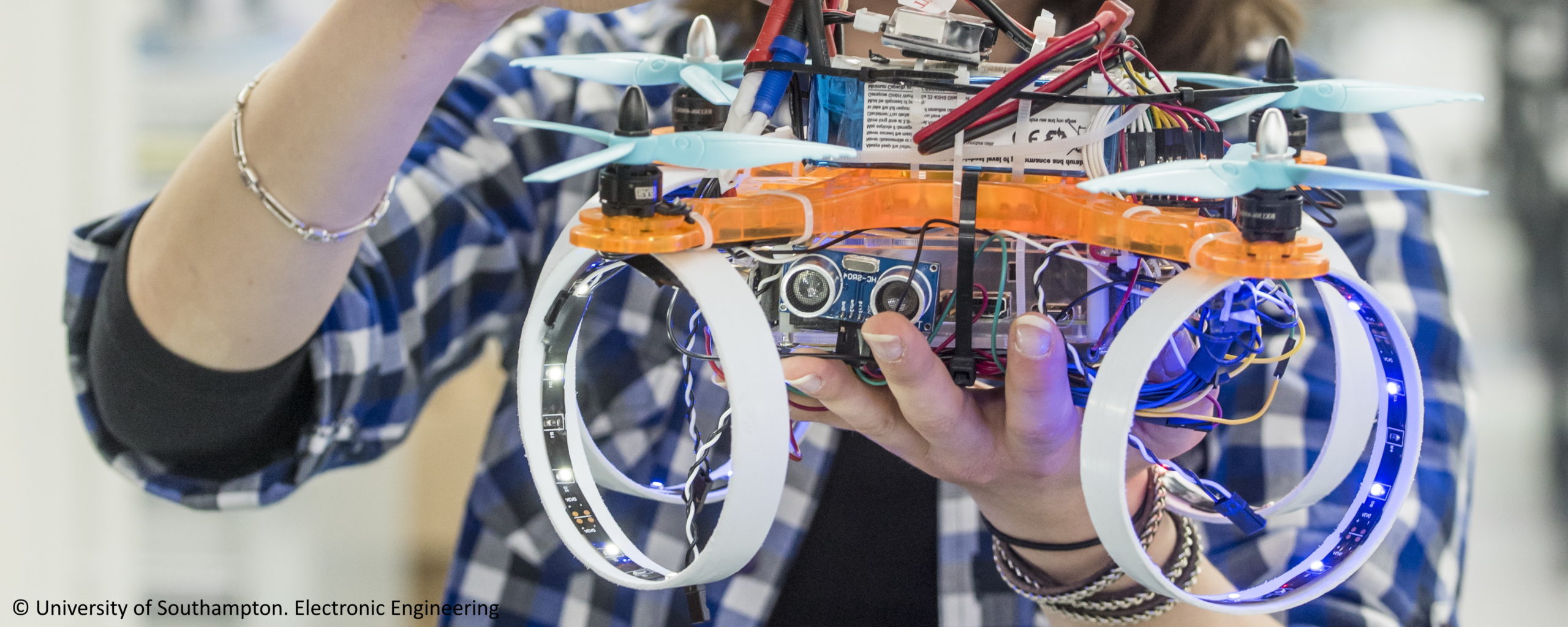You have probably heard of Silicon Valley or Intel’s ‘chips’ inside computers.
‘Chips’ are semiconductors, and the world runs on them. Cars, mobile phones, VR headsets, robots, satellites… almost all technology is based on semiconductors and the Electronics systems they’re part of.
Semiconductors and Electronics are incredibly important. Not only are they integral to our everyday lives today, they will also help to secure our future – from enabling developments in medical equipment, to making advances in green energy, and to providing solutions for our defence and security sectors.
Built on a foundation of maths and science, Electronics requires creative and critical thinking to explore problems and come up with innovative solutions.
In describing Electronics, Gareth, an undergraduate Electronics Engineering Student, said:
“Electronics is how we interact with the physical world around us. It is how we have taken our combined understanding of scientific phenomena and built the modern world. Electronics has allowed us, through our understanding of electromagnetism, to develop phones, radios, televisions, the internet and innumerable other devices. Our understanding of condensed matter physics has allowed us to develop microchips that are indescribably small, which has allowed us to shrink our computers from room-sized to pocket-sized. Our understanding of biological sciences has allowed electronics engineers to develop medical tools, diagnosis probes and biological instruments that have helped to save countless lives, cure countless diseases and build up a wider understanding of the natural world. Electronics is not just about a mobile phone or a laptop or a television – it is the screen through which we interact with the world.”
Resources
Sound interesting? We have a number of resources to help you explore Electronics further.
Why not try our Explore-A-Synth tool to explore the relationships between music, science, technology and engineering, or get hands on with a Microcontroller by signing up to Insight into Electronics?
Why is Electronics Important
Creating the future
The future depends on technology, and technology depends on Electronics. Electronics play a pivotal role in developing healthcare, finding solutions to the climate crisis, improving communication, strengthening security and much more. Electronics Engineers are responsible for driving the innovation that finds solutions to some of society’s big challenges, and improves our day-to-day lives.
Economy
The UK has a considerable Electronics sector which is continuing to grow. However, the demand for capable graduates is currently outstripping supply. Did you know that just 3,245 undergraduates enrolled on Electrical and Electronic Engineering degrees in 2021, and as few as 335 were female? To ensure a thriving industry in the UK, we need more curious, enthusiastic and skilled young people to choose Electronic Engineering, where there is ample opportunity to make a positive impact on the wider world.
What to expect from studying for an Electrical and Electronics Engineering degree?
Your degree will be designed not only to teach you the fundamental subject knowledge you will need to enter the Electronics Industry, but it will also challenge you and encourage you to be curious to get the very best out of you.
There are leading universities nationwide that offer excellent Electrical and Electronics Engineering courses, with options for both three and four year courses – typically, you will graduate with an BEng or MEng.

During your degree, you will have the opportunity to study a range of subject areas, which may include, but are not limited to, some of the interesting areas below:
- Analogue electronics
- Bioelectronics
- Electromagnetics and photonics
- Electrical power
- Communications
- Cyber security
- Digital Electronics
- Microelectronics
- Programming
- Robotics
- Sensor networks and data analysis
You will explore real life case studies and projects, as well as develop your professional skills ahead of graduation.
This video from the University of York gives an overview about what to expect when studying Electronics Engineering:
“Studying electronics really can open the door to a wealth of potential career paths. I would say once you start your degree, pay attention to the things you really enjoy and follow those topics to see where it takes you. There are so many interesting areas emerging in electronics that you could find yourself working in, whether it is in high-speed wireless communications (5G, 6G, and beyond), Internet of Things (IoT), implantable nanoscale electronics, or robotics!”
Ronnie Smith, PhD Student, Edinburgh Centre for Robotics and Co-founder of a Robotics Start Up
Want to find out more? Our top tips...
- Visit university websites, they include a breadth of information about what their courses cover and what it’s like to study there. The UKESF have 27 university partners, you can view them here.
- UCAS processes applications for higher education, such as going to university. It also includes information and services for prospective students.
- Prospects offers advice about work experience, internship opportunities and graduate careers, as well as listings for graduate jobs and postgraduate study.
The UKESF Scholarship Scheme can support you throughout your degree to gain work experience and additional support, learn about our Scholarship here.
Working in the Electronics Sector
“I would definitely recommend a career in electronics because every day is different! Working with cutting edge technology, you will never run out of problems to solve which continues to be interesting and exciting.”
Ben Fletcher, Physical Design Engineer, Graphcore
The Electronics Industry has £98bn annual turnover and contributes 6% of the nation’s GDP. Electronic designers and engineers are in demand, and employers pay high salaries. Graduates can expect to start with a salary of approximately £32,000 (IC Resources 2022), and the mean salary of a full-time Electronics Engineer in the UK is £72,000! What’s more, roles in Electronics often come with other benefits, such as job security and opportunities to travel.